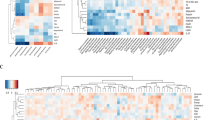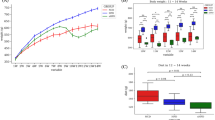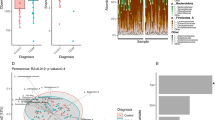Abstract
Roux-en-Y gastric bypass (RYGB) has become a prominent therapeutic option for long-term treatment of morbid obesity and type 2 diabetes mellitus (T2D). Cross talk and pathogenetic consequences of RYGB-induced profound effects on metabolism and gut microbiome are poorly understood. The aim of the present study therefore was to characterize intra-individual changes of gut microbial composition before and 3 months after RYGB by metagenomic sequencing in morbidly obese patients (body mass index (BMI)>40 kg m−2) with T2D. Subsequently, metagenomic data were correlated with clinical indices. Based on gene relative abundance profile, 1061 species, 729 genera, 44 phyla and 5127 KO (KEGG Orthology) were identified. Despite high diversity, bacteria could mostly be assigned to seven bacterial divisions. The overall metagenomic RYGB-induced shift was characterized by a reduction of Firmicutes and Bacteroidetes and an increase of Proteobacteria. Twenty-two microbial species and 11 genera were significantly altered by RYGB. Using principal component analysis, highly correlated species were assembled into two common components. Component 1 consisted of species that were mainly associated with BMI and C-reactive protein. This component was characterized by increased numbers of Proteobacterium Enterobacter cancerogenus and decreased Firmicutes Faecalibacterium prausnitzii and Coprococcus comes. Functional analysis of carbohydrate metabolism by KO revealed significant effects in 13 KOs assigned to phosphotransferase system. Spearmen’s Rank correlation indicated an association of 10 species with plasma total- or low-density lipoprotein cholesterol, and 5 species with triglycerides. F. prausnitzii was directly correlated to fasting blood glucose. This is the first clinical demonstration of a profound and specific intra-individual modification of gut microbial composition by full metagenomic sequencing. A clear correlation exists of microbiome composition and gene function with an improvement in metabolic and inflammatory parameters. This will allow to develop new diagnostic and therapeutic strategies based on metagenomic sequencing of the human gut microbiome.
This is a preview of subscription content, access via your institution
Access options
Subscribe to this journal
Receive 6 print issues and online access
$259.00 per year
only $43.17 per issue
Buy this article
- Purchase on SpringerLink
- Instant access to full article PDF
Prices may be subject to local taxes which are calculated during checkout



Similar content being viewed by others
References
Flint HJ . Obesity and the gut microbiota. J Clin Gastroenterol 2011; 45 (Suppl): S128–S132.
Ley RE, Backhed F, Turnbaugh P, Lozupone CA, Knight RD, Gordon JI . Obesity alters gut microbial ecology. Proc Natl Acad Sci USA 2005; 102: 11070–11075.
Ley RE, Turnbaugh PJ, Klein S, Gordon JI . Microbial ecology: human gut microbes associated with obesity. Nature 2006; 444: 1022–1023.
Turnbaugh PJ, Hamady M, Yatsunenko T, Cantarel BL, Duncan A, Ley RE et al. A core gut microbiome in obese and lean twins. Nature 2009; 457: 480–484.
Schwiertz A, Taras D, Schafer K, Beijer S, Bos NA, Donus C et al. Microbiota and SCFA in lean and overweight healthy subjects. Obesity (Silver Spring) 2010; 18: 190–195.
Larsen N, Vogensen FK, van den Berg FW, Nielsen DS, Andreasen AS, Pedersen BK et al. Gut microbiota in human adults with type 2 diabetes differs from non-diabetic adults. PLoS One 2010; 5: e9085.
Tilg H . Obesity, metabolic syndrome, and microbiota: multiple interactions. J Clin Gastroenterol 2010; 44 (Suppl 1): S16–S18.
Mingrone G, Panunzi S, De Gaetano A, Guidone C, Iaconelli A, Leccesi L et al. Bariatric surgery versus conventional medical therapy for type 2 diabetes. N Engl J Med 2012; 366: 1577–1585.
Schauer PR, Kashyap SR, Wolski K, Brethauer SA, Kirwan JP, Pothier CE et al. Bariatric surgery versus intensive medical therapy in obese patients with diabetes. N Engl J Med 2012; 366: 1567–1576.
Li JV, Ashrafian H, Bueter M, Kinross J, Sands C, le Roux CW et al. Metabolic surgery profoundly influences gut microbial-host metabolic cross-talk. Gut 2011; 60: 1214–1223.
Zhang H, DiBaise JK, Zuccolo A, Kudrna D, Braidotti M, Yu Y et al. Human gut microbiota in obesity and after gastric bypass. Proc Natl Acad Sci USA 2009; 106: 2365–2370.
Furet JP, Kong LC, Tap J, Poitou C, Basdevant A, Bouillot JL et al. Differential adaptation of human gut microbiota to bariatric surgery-induced weight loss: links with metabolic and low-grade inflammation markers. Diabetes 2010; 59: 3049–3057.
Qin J, Li R, Raes J, Arumugam M, Burgdorf KS, Manichanh C et al. A human gut microbial gene catalogue established by metagenomic sequencing. Nature 2010; 464: 59–65.
Manichanh C, Rigottier-Gois L, Bonnaud E, Gloux K, Pelletier E, Frangeul L et al. Reduced diversity of faecal microbiota in Crohn's disease revealed by a metagenomic approach. Gut 2006; 55: 205–211.
Li R, Yu C, Li Y, Lam TW, Yiu SM, Kristiansen K et al. SOAP2: an improved ultrafast tool for short read alignment. Bioinformatics 2009; 25: 1966–1967.
Guarner F, Malagelada JR . Gut flora in health and disease. Lancet 2003; 361: 512–519.
Angelakis E, Armougom F, Million M, Raoult D . The relationship between gut microbiota and weight gain in humans. Future Microbiol 2012; 7: 91–109.
DiBaise JK, Zhang H, Crowell MD, Krajmalnik-Brown R, Decker GA, Rittmann BE . Gut microbiota and its possible relationship with obesity. Mayo Clin Proc 2008; 83: 460–469.
Hartman AL, Lough DM, Barupal DK, Fiehn O, Fishbein T, Zasloff M et al. Human gut microbiome adopts an alternative state following small bowel transplantation. Proc Natl Acad Sci USA 2009; 106: 17187–17192.
Duncan SH, Louis P, Thomson JM, Flint HJ . The role of pH in determining the species composition of the human colonic microbiota. Environ Microbiol 2009; 11: 2112–2122.
Buchwald H, Estok R, Fahrbach K, Banel D, Jensen MD, Pories WJ et al. Weight and type 2 diabetes after bariatric surgery: systematic review and meta-analysis. Am J Med 2009; 122: 248–256, e245.
Reed MA, Pories WJ, Chapman W, Pender J, Bowden R, Barakat H et al. Roux-en-Y gastric bypass corrects hyperinsulinemia implications for the remission of type 2 diabetes. J Clin Endocrinol Metab 2011; 96: 2525–2531.
Campos GM, Rabl C, Peeva S, Ciovica R, Rao M, Schwarz JM et al. Improvement in peripheral glucose uptake after gastric bypass surgery is observed only after substantial weight loss has occurred and correlates with the magnitude of weight lost. J Gastrointest Surg 2010; 14: 15–23.
le Roux CW, Welbourn R, Werling M, Osborne A, Kokkinos A, Laurenius A et al. Gut hormones as mediators of appetite and weight loss after Roux-en-Y gastric bypass. Ann Surg 2007; 246: 780–785.
Spector D, Shikora S . Neuro-modulation and bariatric surgery for type 2 diabetes mellitus. Int J Clin Pract Suppl 2010; 166: 53–58.
Stylopoulos N, Hoppin AG, Kaplan LM . Roux-en-Y gastric bypass enhances energy expenditure and extends lifespan in diet-induced obese rats. Obesity (Silver Spring) 2009; 17: 1839–1847.
Nestoridi E, Kvas S, Kucharczyk J, Stylopoulos N . Resting energy expenditure and energetic cost of feeding are augmented after Roux-en-Y gastric bypass in obese mice. Endocrinology 2012; 153: 2234–2244.
Kootte RS, Vrieze A, Holleman F, Dallinga-Thie GM, Zoetendal EG, de Vos WM et al. The therapeutic potential of manipulating gut microbiota in obesity and type 2 diabetes mellitus. Diabetes Obes Metab 2012; 14: 112–120.
Acknowledgements
We thank Sigrid Nitzsche for the excellent technical support, Dr Dongqian Shen and Dr Liang Xiao who helped us for the functional analysis and gave us some useful advises. This work was supported by grants of the Deutsche Forschungsgemeinschaft to SRB, ME-B, VL-Z, TC (KFO 252/1), of the German Federal Ministry for Education and Research (BMBF) to the German Centre for Diabetes Research (DZD e.V.) to SRB and of the Federal Ministry for Education and Research Germany to SRB and JL (01DR12065).
Author information
Authors and Affiliations
Corresponding author
Ethics declarations
Competing interests
The authors declare no conflict of interest.
Additional information
Supplementary Information accompanies the paper on the The Pharmacogenomics Journal website
Rights and permissions
About this article
Cite this article
Graessler, J., Qin, Y., Zhong, H. et al. Metagenomic sequencing of the human gut microbiome before and after bariatric surgery in obese patients with type 2 diabetes: correlation with inflammatory and metabolic parameters. Pharmacogenomics J 13, 514–522 (2013). https://doi.org/10.1038/tpj.2012.43
Received:
Revised:
Accepted:
Published:
Issue Date:
DOI: https://doi.org/10.1038/tpj.2012.43



